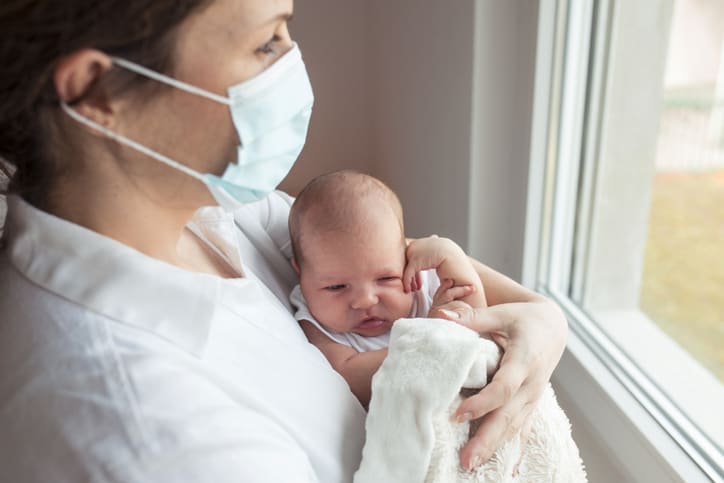For a baby born anytime since 2019, infancy and toddlerhood have been anything but “normal”. Many of these babies were completely isolated as one or both parents worked from home. There have been little or no visits from grandparents, aunts, and uncles, cousins, or family friends. When these little people do go into the world, they likely see nothing but eyes above masks. While there is hope on the horizon for a return to normal as the vaccine is approved for younger children, for our smallest patients, masking and social distancing will continue to be the norm for some time – and parents’ concerns are rising about the long-term effects these precautions mean for their children.
Will these kids ever form a bond with grandparents and other family members? Will they be able to move beyond their fear of strangers? Will they be able to separate from their parents and play with other children?
It’s Going To Be Okay!
All of us here at Alzein Pediatrics understand these concerns. No parent wants to see their child struggle, especially with interactions that we view as natural – like hugging a loving grandmother or making new friends at the park. Fortunately, children are resilient, and actually, kids will adapt much faster than we think – even faster than most adults will. Rest assured that these “COVID babies” will adjust quickly as we are able to unmask, socialize and return to “normal”.
Will My Child Be Able to Pick up Social Cues with Everyone Wearing a Mask in Covid-19?
You don’t just express emotions with your mouth. Your entire face, vocal tenor, and body get involved. We smile with our eyes, furrow eyebrows when angry, and cry when sad. We laugh when happy, yell when angry or frustrated, and cower when afraid. When one aspect of a face is covered, people, children included, use other senses and clues to decipher feelings.
In a University of Wisconsin – Madison study, 80 children ranging in age from 7 to 13 years old were shown pictures of faces displaying sadness, anger, or fear. Some pictures covered part of the face with either a surgical mask or sunglasses and some faces were left uncovered. Children were given six options for emotions and were able to identify the correct emotion for the uncovered faces 66% of the time, proving that children can still understand feelings without seeing an entire face.
How Can I Accelerate My Child’s Bonding with Loved Ones in Covid-19?
Bond building takes time, even before and beyond any pandemic. Parents may have to remind grandparents that children’s hesitancy to climb in their laps shouldn’t be taken as a personal offense. Parents can help the bond grow by looking at photos of loved ones while relating positive stories. Tell or read stories about grandchildren and grandparents spending time together.
Start with short visits and give your child time to get close to anyone they’ve only ever seen on the screen. Reframe your thinking; you are visiting with your parents and your children are just following along. Make sure you communicate this so visitors do not push your children, delaying progress in their relationship. Your child will let everyone know when they are comfortable with talking, playing, and strengthening those special family bonds.
How Can I Help My Child Adjust to the Normal World After Covid-19?
Children learn by watching the adults in their lives. The best thing you can do to help your pandemic baby adjust as life normalizes is to be relaxed, calm, and comfortable with your surroundings. Your child will pick up on your cues and feel the same way.
Because kids do pick up on your cues, be aware of what you are comfortable with so you can set up for success. You do not have to go straight back into full-blown “normal.” Know your own limitations, one experience at a time. If your usual park is too crowded for your liking, head out to a different park. If eating inside a restaurant makes you anxious, stick to outdoor dining or take-out.
Would It Help My Child To Go To Day Care Even If I’m Home All Day in Covid-19?
Even parents who continue to work from home exclusively should consider the social benefits of sending children to daycare or preschool, even a few days a week. Daycare and preschools offer kids new experiences and new social opportunities. Your child’s vocabulary will grow, they will learn a sense of self and how to cooperate and they will be more empathetic and respectful. Daycare and preschool build self-confidence. A French study showed that children were better behaved and better socialized when they were enrolled in a quality childcare center versus being cared for at home.
Be sure that your child’s school or care is following strict COVID-19 protocols. All staff should be masked at all times, equipment should be regularly sanitized and children’s hands and faces should be kept clean, with frequent soap and water washing.
What Else Can I Do For My Covid-19?
Working together, we can all put this pandemic behind us. Vaccinations are vital to saving as many lives as possible, avoiding long-term health issues in our children, and stopping the spread and mutation of this illness. Get your eligible children vaccinated as soon as possible, and make sure everyone in your household is also vaccinated.
COVID pandemic has affected all of us and it is natural to be concerned about how it has affected our children. Check out our pediatric covid page here for more information. Given time, patience, and room to grow, our COVID babies will develop social skills and close bonds with others as life returns to normal.
Questions about your COVID baby, or any of your children? Click here to make an appointment at our urgent care or call 708-424-7600. We’ll be happy to answer all your questions – and schedule any needed COVID-19 or flu vaccines!


